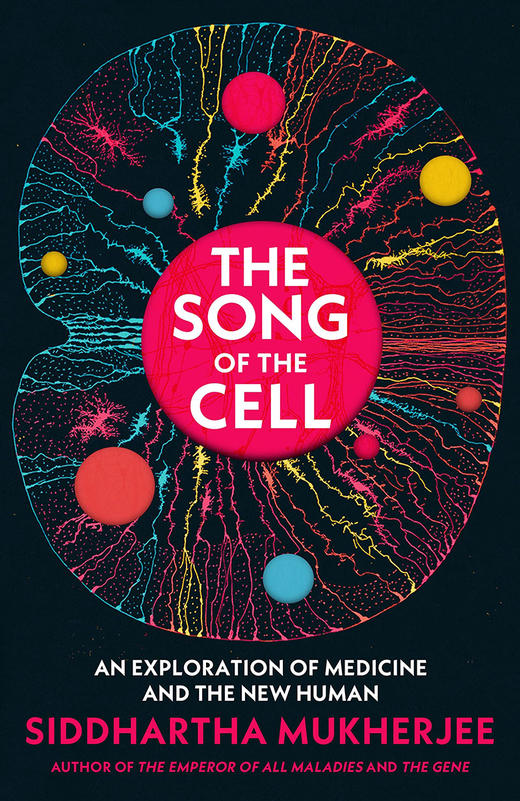细胞之歌 2023比尔盖茨书单 《众病之王》作者新书 悉达多·穆克吉 英文原版 The Song of the Cell 神经细胞网络新进展
| 运费: | ¥ 6.00-25.00 |
商品详情
书名:The Song of the Cell
定价:120.0
ISBN:9781529111781
作者:Siddhartha Mukherjee
版次:2
出版时间:2022-11
内容提要:

细胞之歌 英文原版 The Song of the Cell : An Exploration of Medicine and the New Human
基本信息
出版社 ? : ? Scribner; 第 Reprint 版 (2023年 10月 24日)
语言 ? : ? 英语
平装 ? : ? 504页
ISBN-10 ? : ? 1982117362
ISBN-13 ? : ? 9781529111781
商品重量 ? : ? 581 g
尺寸 ? : ? 15.56 x 3.05 x 23.5 cm
内容介绍
荣获 2023 年 PROSE 生物与生命科学卓越奖和 2023 年 Chautauqua 奖!
被《经济学人》(The Economist)、《奥普拉日报》(Oprah Daily)、BookPage、Book Riot、
纽约公共图书馆等评为《纽约时报》著名图书和年度最佳图书!
在《细胞之歌》一书中,普利策奖获奖作品《病魔缠身的皇帝》和《纽约时报》第一畅销书《基因》的非凡作者穆克吉 "将前沿的研究、
无可挑剔的学术研究、无畏的报道和华丽的散文融为一体,进行了百科全书式的研究,读起来就像一本文学翻页书"(《奥普拉日报》)。
穆克吉从 1600 年代末开始讲述这个波澜壮阔的故事,当时英国杰出的多面手罗伯特-胡克和荷兰古怪的
布商安东尼-范-列文虎克正低头观察他们手工制作的显微镜。他们所看到的引入了一个激进的概念,这个概念席卷了生物学和医学,
几乎触及了这两门科学的方方面面,并永远地改变了这两门科学。事实上,复杂的生物体是由微小的、自足的、自我调节的单元组成的。
我们的器官、我们的生理机能、我们的自我--心脏、血液、大脑--都是由这些单元组成的。胡克将它们命名为 "细胞"。
细胞的发现--以及将人体重塑为一个细胞生态系统--宣告了一种基于细胞治疗操作的新型医学的诞生。髋部骨折、心脏骤停、
阿尔茨海默氏症、艾滋病、肺炎、肺癌、肾衰竭、关节炎、COVID 肺炎--所有这些都可以被重新理解为细胞或细胞系统功能异常的结果。
所有这些都可以被看作是细胞疗法的所在地。
细胞之歌》以生动、清晰、充满悬念的文字,将复杂的科学变得惊心动魄,讲述了科学家如何发现细胞、开始了解细胞,
以及现在如何利用这些知识创造新人类的故事。细胞之歌》分六个部分讲述,并融入了穆克吉作为研究人员、医生和多产读者的亲身经历,
既是一部全景式的作品,也是一部关于人类意义的杰作。
"穆克吉的叙述既抒情又宏大,他带领我们回顾了人类认识的演变过程:从十七世纪发现人类是由细胞组成的,
到我们为治疗目的操纵和配置细胞的尖端技术"(《纽约客》)。
Winner of the 2023 PROSE Award for Excellence in Biological and Life Sciences and the 2023 Chautauqua Prize!
Named a New York Times Notable Book and a Best Book of the Year by The Economist, Oprah Daily, BookPage,
Book Riot, the New York Public Library, and more!
In The Song of the Cell, the extraordinary author of the Pulitzer Prize-winning The Emperor of All Maladies
and the #1 New York Times bestseller The Gene “blends cutting-edge research, impeccable scholarship, intrepid reporting,
and gorgeous prose into an encyclopedic study that reads like a literary page-turner” (Oprah Daily).
Mukherjee begins this magnificent story in the late 1600s, when a distinguished English polymath, Robert Hooke,
and an eccentric Dutch cloth-merchant, Antonie van Leeuwenhoek looked down their handmade microscopes.
What they saw introduced a radical concept that swept through biology and medicine, touching virtually every aspect of
the two sciences, and altering both forever. It was the fact that complex living organisms are assemblages of tiny,
self-contained, self-regulating units. Our organs, our physiology, our selves—hearts, blood, brains—are built from these
compartments. Hooke christened them “cells.”
The discovery of cells—and the reframing of the human body as a cellular ecosystem—announced the birth of a new
kind of medicine based on the therapeutic manipulations of cells. A hip fracture, a cardiac arrest, Alzheimer’s dementia,
AIDS, pneumonia, lung cancer, kidney failure, arthritis, COVID pneumonia—all could be reconceived as the results of cells,
or systems of cells, functioning abnormally. And all could be perceived as loci of cellular therapies.
Filled with writing so vivid, lucid, and suspenseful that complex science becomes thrilling, The Song of the Cell tells
the story of how scientists discovered cells, began to understand them, and are now using that knowledge to create new humans.
Told in six parts, and laced with Mukherjee’s own experience as a researcher, a doctor, and a prolific reader,
The Song of the Cell is both panoramic and intimate—a masterpiece on what it means to be human.
“In an account both lyrical and capacious, Mukherjee takes us through an evolution of human understanding: from the
seventeenth-century discovery that humans are made up of cells to our cutting-edge technologies for manipulating
and deploying cells for therapeutic purposes” (The New Yorker).
- 现代书店 (微信公众号认证)
- 中图上海旗下的一家进口图书专营书店。
- 扫描二维码,访问我们的微信店铺
- 随时随地的购物、客服咨询、查询订单和物流...










